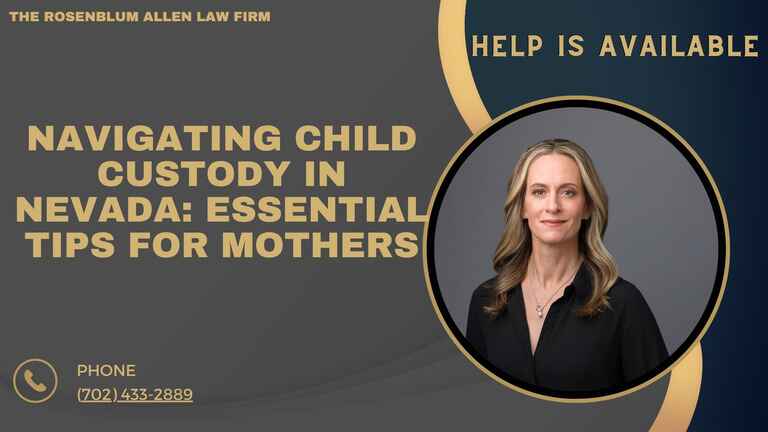
Understanding Child Custody in Nevada
- Joint Physical Custody: Nevada law favors joint physical custody, giving both parents equal rights, regardless of gender.
- Gender-Neutral Laws: Mothers and fathers have equal standing in custody disputes; mothers have no automatic advantage.
- No “Tender Years Doctrine”: The presence of young children does not give mothers preferential custody rights.
- Holiday Schedules: Each Clark County Family Court judge has a standard holiday schedule. If you and your ex cannot agree, the judge will decide.
- Drug Abuse Testing: Parents abusing drugs should expect testing and positive results could impact custody.
- Alcohol Abuse: Suspected alcohol abuse may lead to required alcohol testing or wearing a SCRAM device.
- Domestic Violence: A domestic violence conviction can strengthen your case for primary physical custody.
- CPS Cases: A substantiated CPS case may result in losing custody.
- Interfering with Visitation: Blocking your ex’s access to the children can harm your custody case.
- Breastfeeding and Custody: Fathers still have the right to equal custody, even if the child is breastfeeding.
- Child’s Choice: In Nevada, children cannot choose which parent they want to live with at any age.
- Vacation Permissions: You don’t need your ex’s permission to take your children on vacation, but you must provide details.
- Child Support and Visitation: Visitation is not contingent on child support payments; even if unpaid, the other parent still has visitation rights.
- Termination of Parental Rights: A parent cannot relinquish their rights to avoid child support; a judge must approve terminations.
- School Decisions: Nevada law favors joint legal custody, meaning parents must agree on significant educational decisions.
- Medical Appointments: Both parents have the right to attend all medical appointments for their children.
- School Events: Fathers can attend all school events, including parent-teacher conferences and performances.
- Sharing Information: Joint custody requires sharing significant medical and educational updates with the other parent.
- Ex’s Vacations: You cannot control your ex’s vacations with your children, but you should know the details.
- Sole Custody: Sole custody is rare and typically reserved for extreme cases, such as long-term parental absence.
- Disclosing Your Address: You must disclose your address to your ex unless protected by law.
- Mediation Requirement: You must attend family mediation to resolve custody issues.
- No Lawyer in Mediation: Lawyers are not allowed in mediation; it’s about you and your ex resolving issues.
- Mediation Topics: Be prepared to discuss regular visitation, holiday schedules, vacations, and transportation.
- Child Support in Mediation: Mediation typically does not cover child support matters.
- Parenting Plan: Mediators create a parenting plan based on your mediation agreements.
- Mediation Is Mandatory: If ordered, you must attend mediation, even if you feel it won’t help.
- Mediation Costs: Mediation fees vary based on income.
- Mediator’s Role: The mediator remains neutral, aiming to help both parties resolve.
- Mediation Confidentiality: Discussions in mediation cannot be used as evidence in court.
- Honesty in Mediation: Mediation works best when both parties are honest and open about their intentions.
- Respect in Mediation: Successful mediation requires respect; it is not an opportunity to criticize your ex.
- Commitment to Mediation: Mediation only works if both parties are committed to finding an out-of-court solution.

Protective Orders and Safety Concerns
- Restraining Orders: You can file for a restraining order if your ex is violent or abusive, covering yourself and your children.
- Restraining Order Details: Include your address, employment, and children’s school in the protective order.
- Validity of Restraining Orders: Most orders last 30 days; you can request an extension if needed.
- Extended Protective Orders: You may request to extend a restraining order up to one year.
- Cost of Protective Orders: Filing for a restraining order is free if you are a domestic violence victim.
- Grounds for Protective Orders: Orders can be issued for stalking, harassment, and emotional or financial abuse, not just physical violence.
Managing Vacations and Holidays
- Review Custody Documents: Check your custody agreement before planning trips to ensure compliance with the order.
- Coordinating Vacation Days: Make sure you and your ex agree on how vacation days are counted and planned.
- Communication During Vacations: Include time for children to communicate with the other parent during vacations.
- Advance Planning: Schedule vacations well in advance to avoid conflicts and ensure all parties are on the same page.
- Notification Requirements: Notify your ex of vacation plans, including dates and contact information, per custody agreement requirements.
- Vacation Itineraries: Provide your ex with detailed itineraries, including travel methods, dates, and accommodations.
- Holiday Stress Management: Flexible visitation schedules to minimize stress for everyone involved.
- Child’s Holiday Preferences: Consider what holiday traditions are essential to your children and try accommodating them.
- Sharing Holidays: Allow your ex to enjoy uninterrupted holiday time with the children, just as you would expect for yourself.
- New Holiday Traditions: Develop new holiday traditions post-divorce to make the season less stressful.
Handling Child Abuse Allegations
- Reporting Abuse: Report any suspected abuse to CPS and law enforcement promptly.
- Accusations Against You: Take allegations of abuse seriously and hire a defense attorney experienced in child abuse cases.
- Legal Representation: Never speak to CPS or law enforcement without your lawyer present when accused of abuse.
- Document Interactions: Keep records of all visits with your children and interactions with authorities if accused of abuse.
- Engage in Support Services: Document your participation in parenting classes, therapy, or other supportive services.
- Follow-Up Communications: Use email to follow up on conversations with CPS, and copy your lawyer on all communications.
Supporting Your Children Through Custody Changes
- Consistency is Key: Maintain the same rules and routines for your children before and after separation.
- Open Dialogue: Encourage your children to express their feelings about custody, visitation, and holidays.
- Avoid Surprises: Keep children informed about changes like moves, schedule changes, or new activities.
- Protect Your Kids: Protect your children from conflict with your ex and separate adult matters like child support.
- Seek Professional Help: If your children are struggling emotionally, involve your ex in decisions to seek professional support.
- Avoid Negative Comments: Do not speak negatively about your ex in front of your children.
- Don’t Involve Kids in Disputes: Never ask your children to choose sides or mediate disputes between you and your ex.
Preparing for Court and Legal Representation
- Be on Time: Arrive on time for all court appearances to show respect for the process.
- Courtroom Attire: Dress appropriately and avoid excessive jewelry, especially when asking for alimony.
- Respect Court Protocol: Do not argue with the judge or your ex in the courtroom or hallways; cameras monitor court facilities.
- Bring Only Necessary People: Limit those accompanying you to court to one or two trusted individuals.
- New Relationships: Do not bring a new significant other to court; it can negatively impact the judge’s perception of your case.
- Tell Your Lawyer the Truth: Be honest with your attorney about everything, especially anything that could harm your case.
- Attorney Communication: Be patient when awaiting responses from your lawyer; they may be in court or with other clients.
- Follow Your Lawyer’s Advice: Your lawyer understands the law; prioritize their guidance over advice from friends or family.
- Pay Your Legal Fees: Commitment to your case includes staying on top of your legal fees.
- Birth Certificates: Bring copies of your children’s birth certificates to your initial meeting with your attorney.

Navigating Court Hearings
- Courtroom Security: Be prepared to go through security checks; do not bring prohibited items like weapons.
- Courtroom Conduct: Do not argue with your ex in the courthouse; your behavior may be reported to the judge.
- Hire an Experienced Attorney: Custody cases are complex; hire a lawyer experienced in contested cases.
- Representing Yourself: You can represent yourself in custody court, but a lawyer can significantly improve your chances.
- Pro Bono Representation: If you cannot afford an attorney, look into qualifying for a pro bono lawyer.
Final Tips for Navigating Custody Battles
- Stay Informed: Understand the laws and guidelines for your custody case in Nevada.
- Prioritize Your Children: Keep your children’s best interests at the forefront of all decisions and actions.
- Be Prepared: Know what you want for custody, visitation, and other arrangements before attending court or mediation.
- Manage Stress: Take care of your mental health to better support your children through this process.
- Stay Flexible: Be open to negotiation and compromise when it benefits your children’s needs.
- Stay Organized: Keep all legal documents, court orders, and communication records organized and accessible.
- Respect Court Orders: Follow all court orders to the letter to maintain credibility in your case.
Preparing for Potential Outcomes
- Expect the Unexpected: Custody outcomes may not always go as planned; be prepared for different scenarios.
- Appealing Decisions: If you disagree with a court decision, consult your attorney about the possibility of an appeal.
- Co-Parenting: Strive to co-parent effectively with your ex to minimize conflict and provide stability for your children.
- Avoid Confrontations: Stay calm and composed during interactions with your ex, especially in public or legal settings.
- Communication Strategies: Use written communication when possible to avoid misinterpretations or confrontations.
- Setting Boundaries: Establish clear boundaries with your ex regarding communication and involvement in each other’s personal lives.
After the Custody Battle
- Moving Forward: Focus on creating a stable and loving environment for your children post-custody battle.
- Reassuring Your Children: Continually reassure your children of your love and support during and after custody changes.
- Adapting to New Arrangements: Help your children adjust to new custody or visitation schedules with patience and understanding.
- Building a Positive Co-Parenting Relationship: Work on fostering a cooperative relationship with your ex whenever possible.
- Continuing Mediation: Consider ongoing mediation if conflicts arise post-custody to keep issues out of court.
Legal Protections and Resources
- Know Your Rights: Stay informed about your legal rights as a parent in Nevada custody cases.
- Seek Support Groups: Join support groups for parents battling custody battles for emotional and practical advice.
- Access Legal Resources: Use available legal resources, such as legal aid or community clinics, to support your case.
- Understanding Legal Jargon: Familiarize yourself with standard legal terms used in custody cases to understand court proceedings better.
Handling Ongoing Custody Issues
- Regular Custody Reviews: Keep track of any changes in circumstances that may warrant reviewing or modifying custody orders.
- Addressing Non-Compliance: If your ex is not complying with custody orders, consult your attorney on how to address the issue legally.
- Staying Proactive: Communicate with your ex and adjust to custody or visitation changes.
- Long-Term Custody Planning: Plan for the future by considering how custody arrangements will evolve as your children grow.

Breaking It Down
Navigating child custody in Nevada can be daunting, but understanding these 103 tips will help you stay prepared, protect your rights, and prioritize your children’s best interests. Equip yourself with knowledge, remain flexible, and seek legal support to guide you through this challenging journey.

Frequently Asked Questions
What is the standard holiday schedule for child custody in Nevada?
The Clark County Family Court has a standard holiday schedule for each judge. If parents cannot agree on how to share holidays with their children, the Judge may impose this standard schedule.
Can drug or alcohol abuse impact my child custody case?
Yes, if you are found to be abusing drugs or alcohol, you could lose custody of your children. Parents suspected of alcohol abuse might be required to wear a SCRAM device or undergo random alcohol testing.
What happens if there’s a domestic violence conviction or a substantiated CPS case?
A domestic violence conviction or a substantiated Child Protective Services (CPS) case could significantly affect your custody rights. The former can increase your chances of winning primary physical custody, while the latter might result in a loss of custody.
How does breastfeeding impact custody agreements?
If you are breastfeeding your child, the father will still be allowed equal time. The court ensures that both parents have access to the child, irrespective of the breastfeeding status.
Can my child decide which parent they want to live with at the age of 14?
No, in Nevada, the child does not get to decide which parent they want to live with at 14 or any other age. The court will make decisions based on what they believe is in the best interest of the child.
Do I need my ex’s consent to take a vacation with my children?
No, you do not need your ex’s consent to take a vacation with your children. However, you need to notify them of your travel plans, including where you’ll be staying, the dates of travel, and a phone number where you can be reached in case of an emergency.
Does my ex have rights to attend my children’s medical appointments and school events?
Yes, your child’s father can attend all your children’s medical appointments and school events, including parent-teacher conferences, open house, and school productions.
What is Family Court Mediation? Can my lawyer attend it with me?
Family Court Mediation is a process where you and your ex try to resolve child custody disputes. Lawyers typically do not attend these sessions as the issues to be resolved are between you and your ex.
Can I use proposals made during mediation against my ex in Court?
No, everything that occurs during mediation is confidential. Proposals made in mediation cannot be used as evidence against your spouse in court.
What happens if I don’t attend a court-ordered mediation?
Failure to attend a court-ordered mediation can result in penalties. It’s essential to comply with all court orders during child custody proceedings.

Additional Resources from Our Law Firm
For those navigating complex family law matters, our lead attorney, Molly Rosenblum Allen, Esq., has developed a suite of resources to provide guidance and support during these challenging times. Here’s a list of valuable resources for various aspects of custody law and family concerns:
Las Vegas Custody Attorney: Find expert legal assistance with child custody matters in Las Vegas. Learn more.
Fathers Rights: Understand how fathers can maintain their rights and avoid common mistakes in custody disputes. Discover how.
Supervised Visitation: Gain insights into navigating supervised visitation and what violations to avoid. Read more.
Changing Custody Agreement: If you’re considering modifying your custody agreement in Nevada, get the facts you need to proceed. Find out more.
Grandparents Rights Nevada: Learn about the rights of grandparents in Nevada regarding visitation and custody. Explore your rights.
Long Distance Co-Parenting: For parents living apart, discover strategies for effective long-distance co-parenting. Get the facts.
How a Mother Can Lose a Custody Battle: Mothers can find critical information on actions that could negatively impact custody cases. Understand the risks.
Custody Battle Tips for Nevadans: Equip yourself with tips and strategies to navigate custody battles in Nevada. Read the guide.
What Not To Say In Child Custody Mediation: Words matter in mediation. Learn what to avoid saying to protect your interests. Learn more.
How Much is a Custody Lawyer: Planning your budget for a custody case? Get an idea of the costs involved in hiring a custody lawyer in Las Vegas. Find out here.
Types of Custody: Understand the different types of custody to determine the best arrangement for your family. Explore the types.
At What Age Can a Child Decide to Stop Visitation: Learn at what age a child in Nevada can legally decide about visitation preferences. Read the details.
Molly Rosenblum Allen, Esq. and The Rosenblum Allen Law Firm are dedicated to providing clients with the knowledge and support needed to navigate the legal complexities of family law.

Offsite Resources You May Find Helpful
Here are seven offsite resources that provide information about child custody laws and procedures in Nevada:
FindLaw: This online resource provides free legal information, a lawyer directory, and other resources on a wide range of legal topics, including child custody.
Justia: Justia offers free legal information, a directory of attorneys for various legal issues, and a specific section on family law and child custody.
Avvo: This website provides a directory of lawyers, including those in Nevada, legal advice, and other resources on a broad range of legal topics, including child custody.
Nolo: Nolo provides legal information to consumers and small businesses, including articles, blogs, FAQs, and news on child custody issues.
LegalMatch: This online legal matching service helps individuals find lawyers in their area, including Nevada, and provides advice and resources on family law matters, including child custody.
The Nevada Bar Association: The official website of the Nevada State Bar offers resources for finding a lawyer, including those who specialize in family law and child custody.
Nevada Division of Child and Family Services: The official website for the Nevada Division of Child and Family Services provides information about child custody laws and procedures in Nevada.

What's Next?
Are you a Nevada resident in the middle of a custody battle and need to hire a Las Vegas child custody attorney here in Las Vegas?
Then look no further than The Rosenblum Allen Law Firm!
We’ve helped countless families just like yours get the justice they deserve.
With our years of experience and expert knowledge, we can ensure that your parental rights are not overlooked.
Plus, our commitment to customer satisfaction is second to none – so you know we’ll go above and beyond for you every step of the way.
So don’t wait any longer—call us today at (702) 433-2889, and let’s get started on getting your kids back where they belong: with their loving family!



